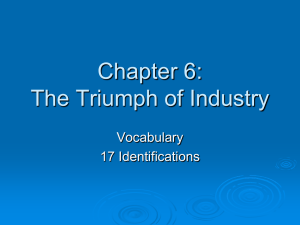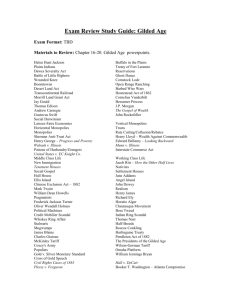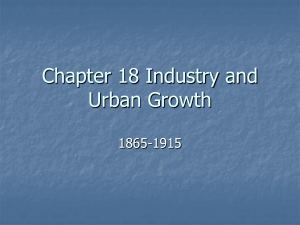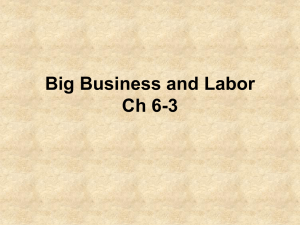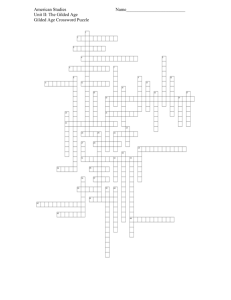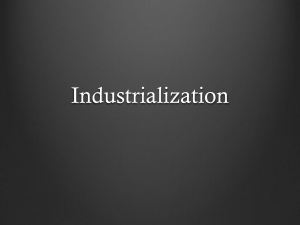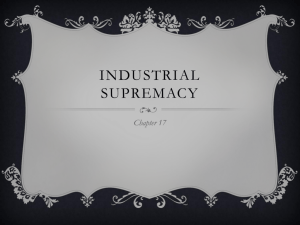American History chapter 17
advertisement
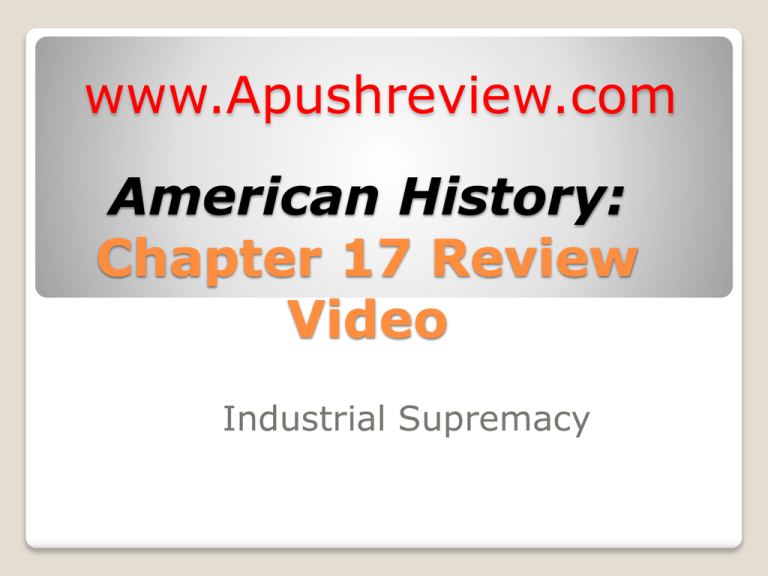
www.Apushreview.com American History: Chapter 17 Review Video Industrial Supremacy Sources of Industrial Growth Henry Bessemer and William Kelly: ◦ Bessemer Process – converted iron into much stronger steel ◦ Steel used in RRs, construction, etc. Steel industry booms in Ohio and PA ◦ Abundance of iron ore Oil – Drake’s Folly - PA ◦ Originally used in lamps Henry Ford: ◦ Made cars affordable – moving assembly line ◦ Raised wages for his workers Wright brothers – from OH ◦ First in flight ◦ Lindberg’s flight in the 1920s boomed industry Sources of Industrial Growth ***Taylorism*** - Frederick Taylor ◦ Subdivided tasks, each individual had a specific task ◦ Made workers interchangeable, less reliance on skilled workers RR expansion affected other industries ◦ Lumber industry cut down forests, ◦ Chicago became main hub - slaughterhouse ◦ Time zones Sources of Industrial Corporations: Growth ◦ Group of stockholders own a business ◦ Limited liability: Owners can only lose value of stock if company goes bankrupt Carnegie: ◦ Steel – Pittsburgh ◦ Owned all aspects of steel production ***Horizontal Integration*** ◦ Buying businesses in a similar industry ◦ Later deemed illegal - monopolies ◦ Ex. – Standard Oil ***Vertical Integration*** ◦ Owning all aspects of production ◦ Ex. – Carnegie Steel Sources of Industrial Growth Pool arrangements: ◦ Businesses agreed to divide up markets amongst themselves – later illegal Trusts: ◦ Originally had a different meaning, later associated with monopolies “Holding Companies”: ◦ Would buy up stocks in other companies, thus gaining more power Capitalism and its Critics Most millionaires were not self-made Tycoons had tremendous influence: ◦ Financial contributions to politicians and parties ◦ “What do I care about the law? H’aint I got the power?” Social Darwinism: ◦ Applied Darwin’s ideas to Humans ◦ Herbert Spencer Advocated that the fittest survived ◦ Appealed to business owners – justified their wealth ***Gospel of Wealth*** ◦ Written by Carnegie ◦ Wealthy should donate money for the community Capitalism and its Critics Horatio Alger: ◦ Wrote “rags to riches” stories ◦ James Garfield ◦ Sold 100 million copies; Henry George – Progress and Poverty ◦ Blamed monopolies for social problems Edward Bellamy’s Looking Backward ◦ A man awakes in 2000 in a utopian society – no want, politics and vice RRs came under attack from many groups ◦ Charged high rates – especially for farmers Industrial Workers in the New Economy Individuals moved from rural to urban areas ◦ Hoped for new economic and social opportunities ◦ Immigrants moved to cities 25 million new immigrants between 1865 and 1915: ◦ ***New Immigrants were from Southern and Eastern Europe*** Italians, Poles, Russians, Greeks, etc. Labor Contract Law: ◦ Allowed employers to recruit laborers by paying for their passage Industrial Workers in the New Economy Working conditions: ◦ Long days – 10-12 hours ◦ Machines replaced some skilled workers Factories hired more women and children ◦ Cheaper pay for unskilled work ◦ Textile industry had largest number of women Industrial Workers in the New Economy Unions (KNOW THIS SLIDE!!) When in doubt, the government(s) and public will side with owners, not unions National Labor Union (1866): ◦ Excluded women workers, feared that it would lower wages “Molly Maguires” ◦ Labor organization in PA – used violence Great RR Strike: ◦ RRs cut pay by 10%, Hayes ordered troops to stop the strike Industrial Workers in the New Economy Still Know This Slide! Knights of Labor: ◦ All workers – men, women, African Americans Skilled and unskilled ◦ Membership grew under Terence Powderly ◦ Hurt by the Haymarket Square Riot AFL ◦ ◦ ◦ ◦ Samuel Gompers Only accepted SKILLED workers Advocated women should remain in the home Focused on “bread and butter issues” Collective bargaining, rarely used strikes Industrial Workers in the New Economy Still Know This Slide! The Homestead Strike: ◦ Carnegie and Henry Clay Frick wanted to break the union at Homestead ◦ The plant was shut down, Pinktertons were called in, after fighting, Pinkertons left ◦ Governor of PA broke up strike with National Guard Pullman Strike (1894): ◦ Pullman Palace Car Company cut wages, did not cut rent in towns ◦ American Railway Union – Eugene V. Debs went on strike ◦ President Cleveland sent troops to end strike Thanks for watching! Subscribe to my channel Help spread the word Questions? Comments? Ideas for videos?Have you tried my ◦ Leave in comments original recipe?
